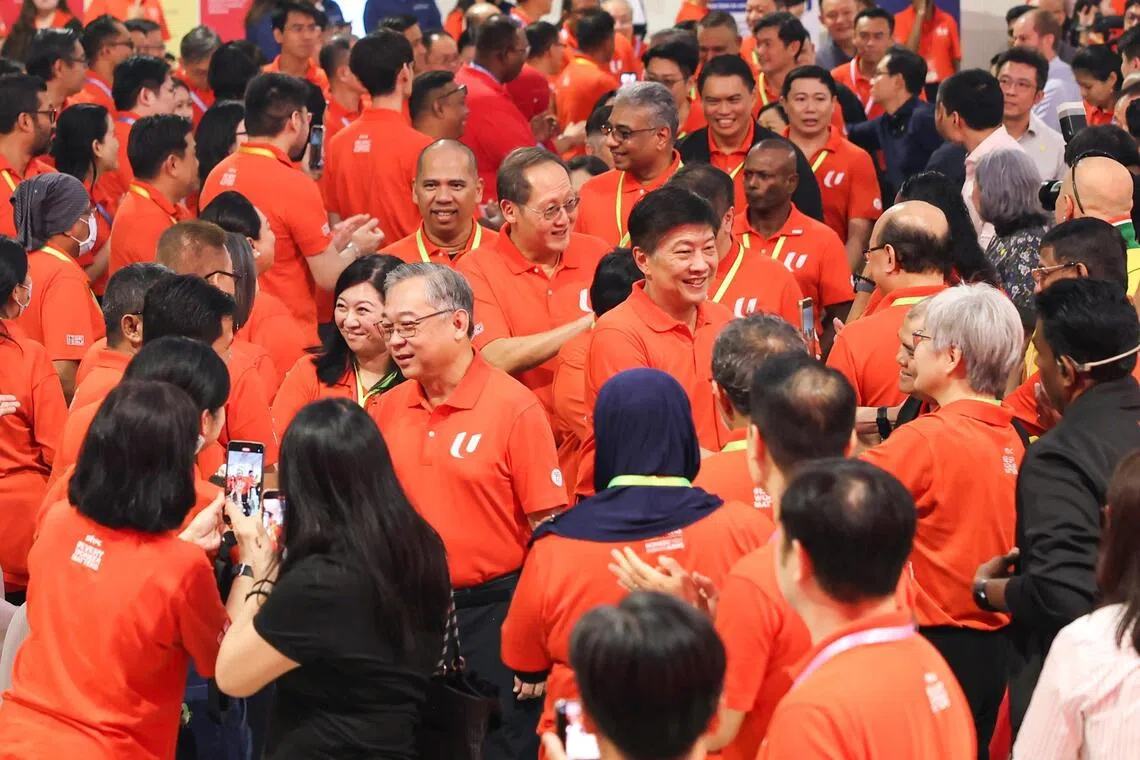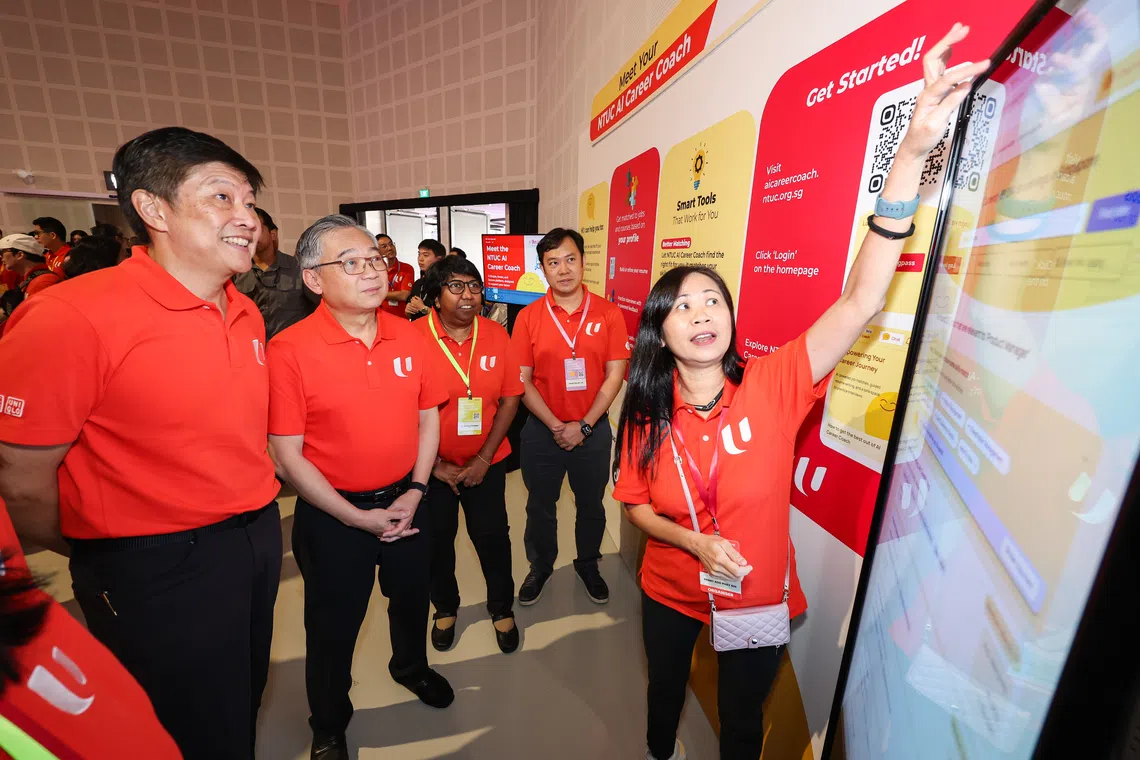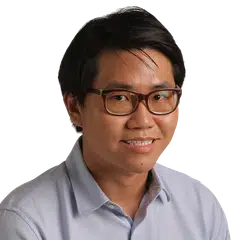Symbiotic relationship between PAP and NTUC lets hard decisions be made: DPM Gan
Sign up now: Get ST's newsletters delivered to your inbox

(Clockwise, from front) DPM Gan Kim Yong, NTUC assistant secretary- general Yeo Wan Ling, Minister for Manpower Tan See Leng and NTUC secretary- general Ng Chee Meng at Downtown East on Nov 13.
ST PHOTO: BRIAN TEO
SINGAPORE – The “symbiotic relationship” between the PAP government and the National Trades Union Congress (NTUC) lets hard decisions be made by Singapore to overcome crises, sustain growth and protect livelihoods, said Deputy Prime Minister Gan Kim Yong on Nov 13.
Speaking at the NTUC Ordinary Delegates’ Conference, DPM Gan touched on the heightened relevance of the three-way partnership between the Government, labour movement and employers amid geopolitical, technological and demographic shifts.
“(Tripartism) also gives businesses and investors confidence that Singapore remains a place where change can be managed responsibly, where policies are rational and predictable, and where workers and employers can both have a stake in our success.”
DPM Gan was the guest of honour at the event, which was held at Downtown East. It marks the midterm of the current central committee, the labour movement’s highest decision-making body.
While much has changed in the world of work, he said, NTUC’s mission to champion the interests, dignity and progress of every worker has remained.
He said NTUC has shown its capability to evolve with the times, through better internal coordination and expanding its reach to youth and platform workers, as well as professionals, managers and executives (PMEs).
Nonetheless, he outlined both ongoing efforts and potential opportunities to further deepen its engagement with these groups for a more relevant and responsive labour movement.
On technology, DPM Gan said shifts including in artificial intelligence (AI), automation and digitalisation hold promise for uplifting productivity, but both firms and workers worry about keeping up with these shifts.
He then praised NTUC’s efforts against this backdrop, which include both an AI-powered career coach and a new “AI Ready SG” initiative to help workers and employers map out how AI would affect them.
He said the initiative ensures that both enterprise and workforce transformation can go hand in hand, allowing for better careers and better wages.
Meanwhile, the NTUC AI Career Coach has received over 3,500 user sign-ups as at end-October since a beta launch in July.
Among other features, users of the AI career coach can refine their resumes, participate in interactive practice interviews, and discover personalised job and course suggestions.
However, DPM Gan underscored the need for NTUC to continue bringing on board more PMEs, as well as youth and platform workers, for a more representative labour movement.
He said a more representative NTUC strengthens tripartism by giving a clearer picture of how work is changing.
“Tripartism will not only be a mechanism for working together, but for planning ahead together.”
Firms would be able to transform in tandem, integrating workforce upgrading into business strategy and operations.
He added: “This inclusiveness reinforces trust and keeps our labour movement effective and constructive.”
Providing a midterm progress update at the conference, NTUC secretary-general Ng Chee Meng said: “For our PMEs and youth, I must say the headwinds remain strong.”

Ms Pansy Koo, senior manager at NTUC’s Employment and Employability Institute, sharing with (from left) NTUC secretary-general Ng Chee Meng, Deputy Prime Minister Gan Kim Yong and NTUC president K. Thanaletchimi, more about the NTUC AI Career Coach during the NTUC Ordinary Delegates’ Conference.
ST PHOTO: BRIAN TEO
Nonetheless, he said the labour movement has built avenues to increase its prominence and relevance to these groups, including a mentors’ network, which will be expanded into company mentorship circles from early 2026.
For youth, Mr Ng said promising results have been seen in outreach efforts such as the NTUC Starter Awards scholarship programme, which has attracted nearly 500 applicants in 2025, up from around 180 the previous year.
He also said the labour movement has strengthened its digital capabilities, including replacing paper forms with instantaneous digital sign-ups.
Mr Ng also sought the support of delegates in attendance to vote for a proposed amendment to the NTUC Constitution to allow platform work associations to be full affiliates.
This would allow associations that represent platform workers to have full voting rights, including for NTUC’s central committee come 2027, at the end of the current committee’s four-year term.
In her welcome address, NTUC president K. Thanaletchimi spoke on the need to lead change, not just respond to it, as well as the importance of grooming leaders who can influence national conversations.
NTUC assistant secretary-general Yeo Wan Ling told reporters on the sidelines of the conference that while much has been done to improve the welfare and safety of platform workers, one potential area for further development is to better engage new platforms with overseas roots that may not be as familiar with tripartism.
She also said that it is important for government support to “lengthen the transition time” for workers to preserve livelihoods, even as technology advances.



